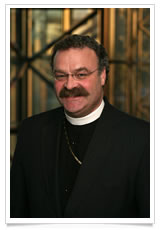by Rev. Matthew C. Harrison
 It’s no secret that we in the Missouri Synod struggle to live in the unity that Christ so freely and generously gives us in His blessed Gospel of salvation by faith in the cross alone. A significant “fault line” that has divided us is whether the Church’s primary task is either witness or confession. Shall we be primarily witnesses of the Gospel or confessors of truth? The Synod creaks and groans and undergoes occasional tectonic shifts relative to these issues.
It’s no secret that we in the Missouri Synod struggle to live in the unity that Christ so freely and generously gives us in His blessed Gospel of salvation by faith in the cross alone. A significant “fault line” that has divided us is whether the Church’s primary task is either witness or confession. Shall we be primarily witnesses of the Gospel or confessors of truth? The Synod creaks and groans and undergoes occasional tectonic shifts relative to these issues.
In fact, these tensions have been with us since the very beginning and are, in a way, represented by the two major streams of Lutheranism (Loehe and Walther), which were melded into one Synod. The seismic synodical divide is full of crags and cliffs—misunderstandings, assumptions, prejudices, and presumptions. Each viewpoint represents more than a bit of the truth.
On the witness side of the fault, the primary, laudable, and biblical goal is reaching the lost—now, in today’s world, in a way people today can actually hear it. “I have become all things to all people, that by all means I might save some” (1 Cor. 9:22). “For the Son of Man came to seek and to save the lost” (Luke 19:10).
Meanwhile, those who are convinced that the fundamental aspect of the Church’s life in this world is confession—that is, holding forth for the truth of the Gospel and all its articles—rightly and intensely identify with New Testament texts that bid us to stand fast against world, culture, and prevailing trends. “Let us hold fast the confession of our hope without wavering, for he who promised is faithful” (Heb. 10:23). “That faith, however, that does not present itself in confession is not firm” (Ap IV 385).
 These two great truths of the Christian life are represented by two powerful and pervasive New Testament words: martyria, or witness, and homologia, or confession. Witness is used in the New Testament for a straightforward witness to facts (Matt. 18:16). The apostolic circle were witnesses to the resurrection in the legal sense, that is, they actually saw the risen Christ. As such, they were commissioned by Christ Himself to “bear witness” to what they had seen and heard (Matt. 10:18), and such witness produced faith in others.So right from Pentecost, the witness becomes more than just a dispassionate reciting of historical fact. To be a witness was now to speak with faith and conviction about what God had done and continues to do in Jesus: To save people from their sins. In the second century, there arose the common use of witness as martyr for a Christian who had been murdered for the faith. It is clearly the intent of Jesus that the Church bear witness through all time to His saving Gospel; that is at the essence of her very being and life (Luke 21:13; Is. 44:8; Acts 1:8).
These two great truths of the Christian life are represented by two powerful and pervasive New Testament words: martyria, or witness, and homologia, or confession. Witness is used in the New Testament for a straightforward witness to facts (Matt. 18:16). The apostolic circle were witnesses to the resurrection in the legal sense, that is, they actually saw the risen Christ. As such, they were commissioned by Christ Himself to “bear witness” to what they had seen and heard (Matt. 10:18), and such witness produced faith in others.So right from Pentecost, the witness becomes more than just a dispassionate reciting of historical fact. To be a witness was now to speak with faith and conviction about what God had done and continues to do in Jesus: To save people from their sins. In the second century, there arose the common use of witness as martyr for a Christian who had been murdered for the faith. It is clearly the intent of Jesus that the Church bear witness through all time to His saving Gospel; that is at the essence of her very being and life (Luke 21:13; Is. 44:8; Acts 1:8).
To my great surprise and delight, while studying and paging through my Greek New Testament, I came upon a truth which is, I believe, vital for us as we seek to live together as a church. I discovered that in the New Testament, witness and confession belong together.
Finally, the witness is given by the disciples
themselves (Jn. 15:27; 1 Jn. 4:14). Their
witness is confession. “Witness” (Marturein)
and “confession” (homologein) merge into one
another (1 Jn. 4:14 ff.)” [Kittel, Theological
Dictionary of the New Testament, 4:498].
I’ve come to be convinced by the Bible that witness requires the strong confession of the truth as it is in Jesus—“teaching all things which I have commanded you” (Matt. 28:19); “the doctrine and all its articles” (FC SD X 31). Likewise, confession (“Here I stand!”) that does not “Go, therefore, into all nations” is not the full confession of Jesus. Put simply, witness without confession is not witness, and confession without witness is not confession.
Confession or witness? Yes! God grant us such a life together.
“Let’s go!” Mark 1:38
e-mail: president@lcms.org
Web page: www.lcms.org/president
December 2010





